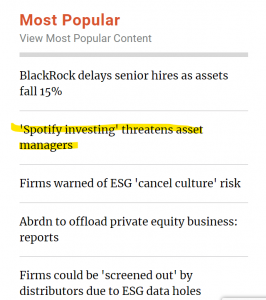‘Spotify investing’ threatens asset managers – Ignite Europe – 20 July 2022
Excerpt: Personalisation is potentially direct indexing’s strongest selling point, with clients starting with an initial index and then adding other indexes, or adding or removing individual stocks, based on their preferences.
This flexibility means it is the “next step” for investors, says Mattias Eriksson, founder and chief executive officer of C8 Technologies, a direct index solution provider. “No one buys ready-mixed music CDs anymore when you have personalised playlists on Spotify [a music streaming service]. Probably we will see the same level of personalisation in the asset management industry,” says Mr Eriksson.
The ability for clients to tailor their portfolios means it will benefit from growing demand for investments that consider ESG considerations, experts say.
Mr Eriksson says European institutional investors are already taking advantage of this aspect. He gives the example of a pension fund that has its own ESG rules, which it can apply on top of an index in which it invests. He says that direct indexing is not restricted to equity investing, adding to its appeal among European institutions and family offices. Over the past six months, there has also been “a lot” of interest in alternative investment strategies, such as those using futures contracts, Mr Eriksson says.
Meanwhile C8 is looking to expand the take-up of its services among wealth managers, which would increase the use of direct indexing with retail clients.
